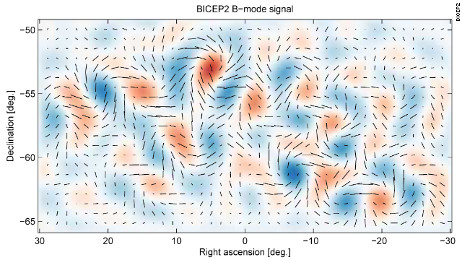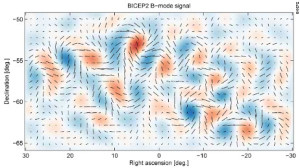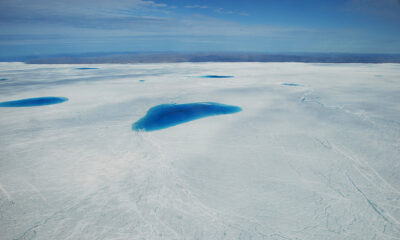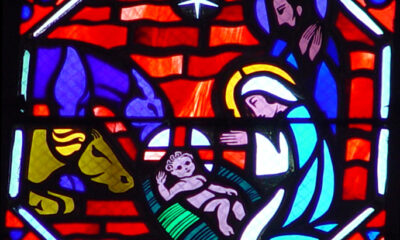Creation Corner
Gravity waves – not so fast

Three months and two days ago, John Kovacs and his team boasted before the world they had found the signature of gravity waves in deep space. This, they said, proved the long-held theory of spatial inflation, the key event in the Big Bang. Now at last they published their findings. And they have to admit they might have it completely wrong.
Gravity waves: the big boast
The Kovacs team used a special instrument called BICEP-2. That stands for Background Imaging of Cosmic Extragalactic Polarization, Second generation. The polarization they were looking for (B-mode) is circular, not the familiar linear form. B-mode polarized light would be a sign of the ripples of gravity that, by convention, are the leftover signature of the Big Bang.
So three months ago Kovacs and company held a press conference. But they would not publish until two days ago, in Physics Review Letters (summary here; PDF file here).
And in their abstract they make this key admission:
these models are not sufficiently constrained by external public data to exclude the possibility of dust emission bright enough to explain the entire excess signal.
Key mistakes

A map of the Gravitation Waves Background in the Universe, supposedly discovered by scientists on March 17, 2014. Photo: California Institute of Technology, released into the public domain.
Any of several cosmologists could have predicted this pullback. In fact, Adrian Cho, writing in Science last month, almost did. “The signal,” he wrote, “a subtle pattern in the afterglow of the big bang, or cosmic microwave background, could be an artifact produced by dust within our own galaxy.”
The cosmic microwave background is, of course, the white-noise-like ambient “light” of space. Everyone seems to agree it has persisted from the beginning of the universe, however many years ago that beginning happened.
Raphael Flauger, writing in Cosmology and Nongalactic Astrophysics on 28 May 2014, also warned the Kovacs team had spoken too soon.
BICEP1 and BICEP2 data alone cannot distinguish between foregrounds and a primordial gravitational wave signal.
Flauger pointed out one other flaw in Kovacs’ analysis, that Agence France-Presse and The New York Times both missed. Kovacs and company searched on only one frequency. Flauger said specifically someone must search at higher frequencies for this polarization to tell the difference between a primordial gravity wave and a cloud of dust from our own galaxy.
A creationist speaks
[ezadsense midpost]
Walter T. Brown, of the Center for Scientific Creation (Phoenix, Ariz.), spoke to this Examiner about the gravity-wave controversy today. “[The Kovacs team] made several mistakes,” he said. “First, they examined only one frequency; they needed to examine a much wider band of microwave radiation. Second, they held a big press conference before publishing, without even submitting their work for any of the usual peer review. Nor did they account for the nine other experiments now running to find the same thing.” Brown also pointed out no other team has found any B-mode gravity-wave signature.
“And third,” Brown went on, “they didn’t deal adequately with one other problem: the signal they got was twice as strong as it should have been.” No other reporter or commentator has picked up on this last.
Brown’s conclusion: the Kovacs team does not have the proof they sought of spatial inflation. “We cannot disprove it,” he said, “but they cannot prove it, either.”
So what did make the cosmic microwave background? Not a Big Bang, but a Big Stretch. In his book, In the Beginning: Compelling Evidence for Creation and the Flood, Brown lists eleven verses in the Bible that talk about God stretching out the heavens. (The poet Job mentioned it once, as did King David and the prophet Zechariah. Isaiah mentioned it six times, and Jeremiah twice.) Brown also says the “light” of Day 1 of Creation was a cosmic visible background. This cooled to microwave level on Day 4 – at which time God also formed the sun and the moon to give the light the earth now enjoys.
Reprinted from examiner.com
[ezadsense leadout]
Terry A. Hurlbut has been a student of politics, philosophy, and science for more than 35 years. He is a graduate of Yale College and has served as a physician-level laboratory administrator in a 250-bed community hospital. He also is a serious student of the Bible, is conversant in its two primary original languages, and has followed the creation-science movement closely since 1993.
-

 Civilization3 days ago
Civilization3 days agoA Better U.S. Strategy for Greenland Than Annexation
-

 Education3 days ago
Education3 days agoIgnoring the Science: The Curious Case of Cell Phone Bans
-

 Guest Columns4 days ago
Guest Columns4 days agoWaste of the Day: Thousands of Earmarks in Illinois State Budget
-

 Education4 days ago
Education4 days agoA Solid Core Enlivens Free Speech and Viewpoint Diversity
-

 Executive3 days ago
Executive3 days agoWaste of the Day: Utah University Trustees Don’t Know Their Job
-

 Civilization4 days ago
Civilization4 days agoEnd the Filibuster – Or Stop Pretending To Govern
-

 Executive4 days ago
Executive4 days agoWaste of the Day: $8 Water Filter Costs the Government $156
-

 Civilization2 days ago
Civilization2 days agoTrump’s Longest Speech, His Shortest Margin for Error













[…] from examiner.com and Conservative News and […]